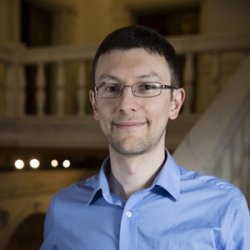A new study reveals that quantum physics can cause mutations in our DNA
An innovative study has confirmed that quantum mechanics plays a role in biological processes and causes mutations in DNA.

Quantum biology is an emerging field of science, established in the 1920s, which looks at whether the subatomic world of quantum mechanics plays a role in living cells. Quantum mechanics is an interdisciplinary field by nature, bringing together nuclear physicists, biochemists and molecular biologists.
In a research paper published by the journal Physical Chemistry Chemical Physics, a team from Surrey's Leverhulme Quantum Biology Doctoral Training Centre used state-of-the-art computer simulations and quantum mechanical methods to determine the role proton tunnelling, a purely quantum phenomenon, plays in spontaneous mutations inside DNA.
Proton tunnelling involves the spontaneous disappearance of a proton from one location and the same proton's re-appearance nearby.
The research team found that atoms of hydrogen, which are very light, provide the bonds that hold the two strands of the DNA's double helix together and can, under certain conditions, behave like spread-out waves that can exist in multiple locations at once, thanks to proton tunnelling. This leads to these atoms occasionally being found on the wrong strand of DNA, leading to mutations.
Although these mutations' lifetime is short, the team from Surrey has revealed that they can still survive the DNA replication mechanism inside cells and could potentially have health consequences.
Dr Marco Sacchi, the project lead and Royal Society University Research Fellow at the University of Surrey, said: "Many have long suspected that the quantum world – which is weird, counter-intuitive and wonderful – plays a role in life as we know it. While the idea that something can be present in two places at the same time might be absurd to many of us, this happens all the time in the quantum world, and our study confirms that quantum tunnelling also happens in DNA at room temperature."
Louie Slocombe, a PhD student at the Leverhulme Quantum Biology Doctoral Training Centre and co-author of the study, said: "There is still a long and exciting road ahead of us to understand how biological processes work on the subatomic level, but our study – and countless others over the recent years – have confirmed quantum mechanics are at play. In the future, we are hoping to investigate how tautomers produced by quantum tunnelling can propagate and generate genetic mutations.”
Jim Al-Khalili, a co-author of the study and Co-Director of the Leverhulme Quantum Biology Doctoral Training Centre at the University of Surrey, said: "It has been thrilling to work with this group of young, diverse and talented thinkers – made up of a broad coalition of the scientific world. This work cements quantum biology as the most exciting field of scientific research in the 21st century.”
Note to editors
Click here to read the full report.
Click here for more information on the Leverhulme Quantum Biology Doctoral Training Centre.
The Leverhulme Trust was established by the Will of William Hesketh Lever, the founder of Lever Brothers. Since 1925 the Trust has provided grants and scholarships for research and education. Today, it is one of the largest all-subject providers of research funding in the UK, distributing approximately £100m a year. For more information about the Trust, please visit www.leverhulme.ac.uk and follow the Trust on Twitter @LeverhulmeTrust

